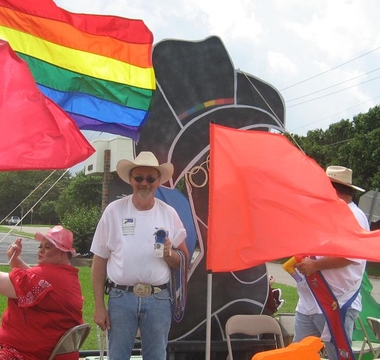Too edgy? Too tame? Gay pride parades spark debate

DAVID CRARY, AP National Writer
Initiated as small, defiant, sexually daring protests, gay pride parades have become mainstream spectacles patronized by corporate sponsors and straight politicians as they spread nationwide. For many gays, who prize the events' edginess, the shift is unwelcome — as evidenced by bitter debate preceding Sunday's parade in Dallas.
At issue was a warning from police and organizers that rules related to nudity and sexual behavior would be enforced more strictly than in past years. Police said anyone violating indecency laws in front of children could be charged with a felony.
The warnings outraged some local activists, whose reactions swiftly echoed through gay-oriented social media nationwide.
"To make the parade more 'family friendly' and to accommodate comfort for the increasing number of attending heterosexuals and corporate sponsorship, participants are being asked to cover up!" activist Daniel Scott Cates wrote on his Facebook page. "The 'queer' is effectively being erased from our pride celebration."
Another activist, Hardy Haderman, wrote an aggrieved column for the Dallas Voice, a weekly serving the gay community.
"The assimilationists insist we tone down and throw away all our joyous sexiness," he wrote. "Why? To do that turns the Pride Parade into a We-Are-Ashamed parade, and I refuse to be part of that."
Despite the controversy, the Dallas Voice reported that the parade was "business as usual," with larger than normal turnout marking the event's 30th anniversary. The only reported arrests were for intoxication, not for nudity or lewdness. Some marchers did dress in skimpy underwear, despite pre-parade speculation this would not be allowed.
The parade is organized by the Dallas Tavern Guild, an association of gay bars. Its executive director, Michael Doughman, said the change this year did not involve any new rules — but rather a warning that existing rules would be more strictly enforced.
These rules, he said, were drafted to conform with the city's public nudity ordinance and the state's anti-obscenity law, which bars the parade from featuring sexual paraphernalia and "real or simulated sex acts."
"Most people abided by the rules — but we had some individuals who decided to push the envelope a little to see how far they could go," Doughman said of recent parades. "So we asked our police security officer to bring it up as a reminder."
"We aren't trying to stifle anybody's right to be gay or express themselves," he added. "We are trying to create a friendly environment for everybody. We can be gaywithout being naked."
Among gay activists beyond Dallas, the dispute elicited sharply divided opinions. Those agreeing with Doughman included John Aravosis, a prominent Washington-based blogger.
"I got involved in gay politics 20 years ago in order to win the right to serve in the military, have a job, and get married, among others," he wrote. "It had nothing to do with public nudity... I'm open to a good explanation of how this links back to our civil rights, but I've not heard a good one yet."
However, Michael Diviesti of Austin, Texas — leader of the state branch of the gay-rights group GetEQUAL — said pride parades were in danger of losing their essential character.
"This is my celebration of myself," he said. "Why should I have to tone that down because someone else might be looking? It's like putting yourself back in a closet."
Nationally, there's no question that pride parades have become more mainstream and family-friendly as more gays and lesbians raise children, and more heterosexuals turn out to watch. With the surge of corporate sponsorships, they've become a big business in some cities.
As a result, there's disagreement within the gay community as to what sort of imagery the parades should present.
"It's something we'll continue to struggle with," said Gary Van Horn of Pittsburgh, a co-president of InterPride, which represents organizers of pride events across the U.S. and abroad.
InterPride avoids taking sides in disputes over the character of a given parade, Van Horn said. "I don't think there's one-size-fits-all answer."
Richard Pfeiffer, an organizer of Chicago's annual pride parade for 40 years, said rules on lewdness and nudity vary from city to city, dependent on local laws and attitudes.
"We have our rules in Chicago, and on the whole our entries follow them," he said. "If people step over those guidelines, we will just say, 'For next year, don't do that.' We don't pull people out of the parade on the spot."
One group with a keen interest in the debate is Family Equality, which represents families in which the parents are gay, lesbian, bisexual or transgender.
The group's executive director, Gabriel Blau, says he and his husband marched earlier this year in New York City's pride parade with their 5-year-old son — even though there were parts of the parade they considered too risque for him to see.
Blau described the debate in Dallas and other cities as "a healthy conversation" and said Family Equality encouraged parade organizers to keep children in mind as they orchestrate their events.
"We are not a family-values organization that's going to say what children should and shouldn't see," he said. "But we've been working with pride celebrations to create family-friendly spaces, so that the whole community can participate."
These areas might include a "bouncy castle" or kid-oriented entertainers, Blau said.
A gay father, Chase Lindberger, who recently married in Minnesota, said he and his husband had no qualms about taking their two young children to the Twin Cities Pride Parade this summer.
"It's an important event for the community that my children are a part of," Lindberger said. "They see people being very dramatic and colorful, and I think that's wonderful."
___
Follow David Crary on Twitter at http://www.twitter.com/craryap
Copyright 2013 The Associated Press. All rights reserved. This material may not be published, broadcast, rewritten or redistributed.
September 17, 2013





